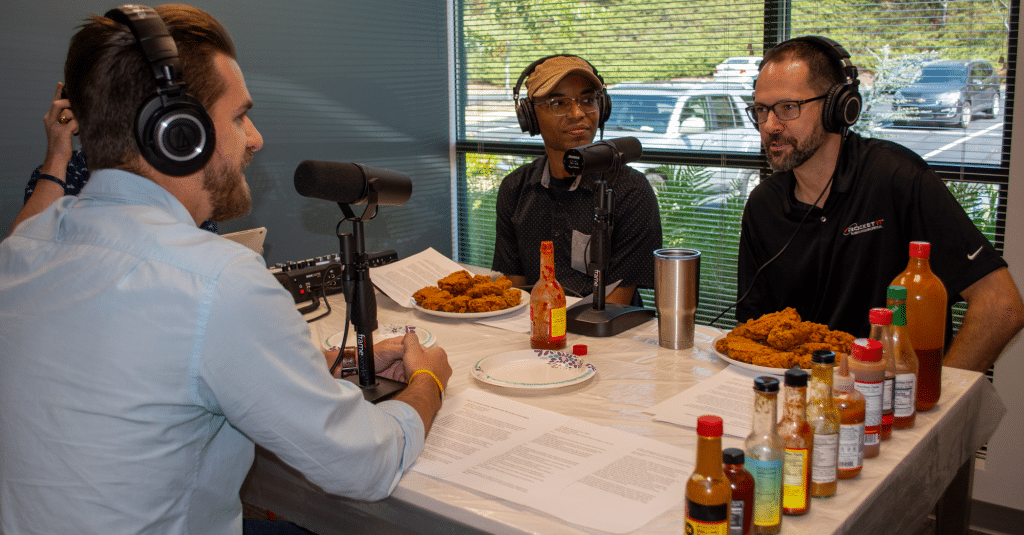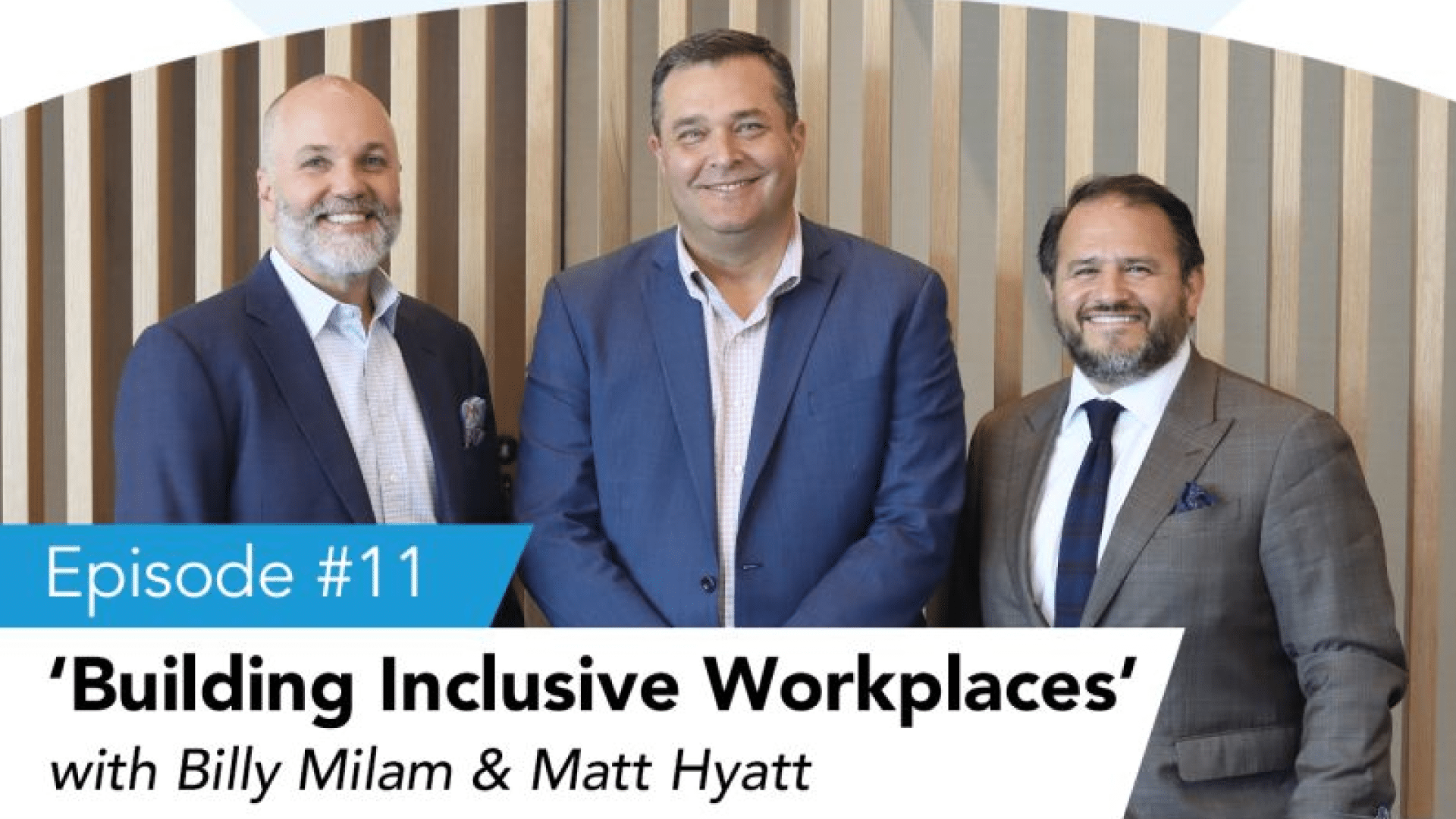Rocket IT Business Podcast | Patrick Richardt | Spice & Advice Hot Wing Challenge | Ep 5

Day in and day out, Rocket IT team members are determined to find better ways to support clients and have a blast while doing so. In this episode of the Rocket IT Podcast, we’re making ourselves accountable for those two core values, and quite literally placing them where our mouths are.
Breaking tradition from previous installments, this segment features three engineers willing to place both their knowledge and taste buds on the line. While answering some of our listeners’ most burning technical questions, participants are tasked with simultaneously eating increasingly spicy wings. As the intensity of each question increases, so too does the heat of the sauce.

In This Episode, You’ll Hear More About…
- How to boost network speeds
- What to look for in email scams
- The steps to properly secure data
- How to simplify password management
- The importance of thoughtful admin privileges
- The impact cloud storage and backups can have on information management
List of Hot Sauces and Scoville Units
| Sauce | Scoville Units |
|---|---|
| Original Louisiana Hot Sauce | 550 |
| Hot One Classic | 1,800 |
| Valentina | 2,100 |
| Crystal | 3,000 |
| Texas Pete Hotter Sauce | 3,250 |
| Secret Aardvark | 5,000 |
| Caribbean Habenero | 5,400 |
| Pirate’s Lantern – Pepper Sauce | 7,500 |
| Dirty D**** | 21,000 |
| Hot Ones Los Calientes | 36,000 |
| Da Bomb | 135,000 |
| Hot Ones The Last Dab Reduxx | 2,000,000 |
For More Information

Host: Patrick Richardt

Guest: Devon McLean

Guest: Todd Case
Show Notes
Patrick Richardt (00:00):
Day in and day out, Rocket IT Team members are determined to find better ways to support clients and have a blast while doing so. In this episode of the Rocket IT podcast, we’re making ourselves accountable for those two core values and quite literally placing them where our mouths are.
Intro Music (00:14):
[music playing]
Patrick Richardt (00:29):
Hello and welcome to the Rocket IT podcast. My name is Patrick Richardt, Senior Systems Engineer for Rocket IT, and I’ll be your moderator for an IT showdown. Breaking tradition from previous episodes, today’s show features a little segment we like to called Spice and Advice. To give you an idea of how this is going to work, two Rocket IT engineers have been selected to answer technology based questions that we commonly receive from clients. While this seems simple enough, we’ve added a catch to keep things interesting. In front of each participant, we placed a plate of spicy chicken wings as questions are asked, each individual have to eat and finish one wing. But the challenge doesn’t end there. In each round, the difficulty of questions will continue to increase and with it so to the spiciness level. While these Rocket IT Engineers tout intellectual minds and ironclad taste buds, today’s segment is really going to put their assets to the ultimate test before introducing our brave participants.
Patrick Richardt (01:31):
For today’s discussion, I would like to remind audience members that the audio for today’s recording is available on all major podcasting platforms. Additionally, if you enjoy today’s recording and would like to hear similar content, feel free to share your feedback by sending us a message at podcast@rocketit.com. Now, without further hesitation, I’d like to welcome Devin McLean and Todd Case two of Rocket IT’s finest Engineers. How are you gentlemen feeling about today’s discussion?
Devon McLean (01:57):
I’m totally hyped right now. I’m ready for some spicy things and Spicy questions.
Patrick Richardt (02:01):
You sound very hyped.
Devon McLean (02:04):
This is my excited voice.
Todd Case (02:06):
Yeah, much the same here. Let’s go.
Patrick Richardt (02:08):
So to give the audience an idea of the credibility that each of you hold when it comes to answering technical questions, I’m going to ask that you both briefly elaborate on your roles within Rocket IT. Devon, let’s begin with you.
Devon McLean (02:19):
Alright. I am a Project Engineer, um, and I also handle the Security for Rocket IT. That’s pretty much what I do all day. Lots of spreadsheets, lots of spam filters.
Todd Case (02:31):
Uh, this is Todd here and I’m an Escalations Engineer on the Service Desk Team. I assist the Level One Engineers. Uh, I also receive escalations and work those to, uh, resolve customer issues.
Patrick Richardt (02:43):
Sweet. All right, well the introductions are out of the way, so let’s go ahead and get our feet wet. Our mouths hot with some low difficulty questions. All right. Question one. This is for you Todd. Clients’ Outlook mailbox is full and they’re no longer able to receive emails. What do you do? And the first hot sauce that we’re going to use is the Louisiana, the perfect hot sauce. Quite the crunch you have there, Todd.
Todd Case (03:10):
Why, Thank you. Alright, so what I would do first is check to see what their email set up is. If it’s a exchange server internal, go ahead and increase their mailbox quota. If it’s Office 365, see if we can do that through either licensing or otherwise. If not, go ahead and save a bunch of email offline and PSD files.
Patrick Richardt (03:30):
Excellent. Todd. Well done. Thank you. All right Todd. Spicy level one is out of the way. What’d you think of it?
Todd Case (03:38):
Yeah, just slight tickle.
Patrick Richardt (03:42):
A slight tickle. Well that’s one way to describe it. Alright, next question is for you Devon. A user is experiencing quite a bit of spam from an email address that they don’t know. How can they determine if the emails are in fact spam and how would you remedy the problem? Wow, Devon that’s, that’s fantastic. And he just bit into the classic hot sauce. The heat with heart.
Patrick Richardt (04:04):
We’re waiting.
Devon McLean (04:06):
Okay. So that one’s actually pretty easy. If it’s an email from one person, we can just block that email address and then have the client contact them to make sure that their email address isn’t being hacked or isn’t being spooked. And if these are legitimate emails, we can let them go through after they’ve been scan to make sure that no malicious content has been contained in them.
Patrick Richardt (04:27):
Excellent. How was that wing?
Devon McLean (04:29):
It’s like a zero on the spice level still.
Patrick Richardt (04:32):
Well folks, we’re still on the zero scale. I think we’re going to take it up four notches.
Patrick Richardt (04:41):
Alright Todd, back to you. An organization has set privacy rules on certain files in its network, but one individual is unable to access the content despite being given admin privileges. What should you check before moving forward with a resolution? And with that Todd, just bit into the Valentina Salsa Picante.
Todd Case (05:01):
Well, I would show NTFS permissions first. Despite admin privileges, they might not be in the proper security group to have a rights read or write access to that certain folder or those files.
Patrick Richardt (05:11):
100% correct. Todd, a fantastic answer. How about the spiciness level of the Valentina?
Todd Case (05:17):
It’s pretty good. I call it the breakfast hot sauce, but yeah.
Patrick Richardt (05:21):
All right folks, we’ve reached breakfast level hot sauce. It’s what you put on your eggs. I feel like we need to move up. Okay. Not only are we moving up on the spiciness meter, we’re also going to move up on the hardness of the question meter with a little extra crunch.
Patrick Richardt (05:36):
Devon, this question’s for you. Despite a printer being connected to the network and having worked in the past, it no longer prints documents. What could be wrong and how would you fix the issue?
Devon McLean (05:47):
Uh, first let’s see if the printer is connected through ethernet and to make sure it has a static IP address assigned to it. If that is correct, then we can make sure that users are able to ping that printer and if they can, then we can check something on the print server for checking whether or not it’s printing properly there.
Patrick Richardt (06:04):
Very technical Devon, I would have just checked the tray. Hey, you got paper in it. PC load letter show tray one empty. That’s your problem. How uh, how was the Aardvark Habanero hot sauce?
Devon McLean (06:19):
Uh, this is equivalent to spicy mustard, so it’s still a zero. We have a confirmation test going.
Patrick Richardt (06:26):
Yeah, it’s hotter than spicy mustard. Still not very hot, but you must have no taste buds. Where are you at?
Todd Case (06:34):
Well it says yellow bird habenero condiment.
Patrick Richardt (06:37):
Oh, yellow bird. Tweet. Tweet. Alright, moving on to you Todd. I was waiting for that crunch. Client believes their email address has been compromised. What should be done to determine if this is the case?
Todd Case (06:49):
We’ll make sure that they can log in through web mail.
Patrick Richardt (06:52):
How’s that? How’s that sauce?
Todd Case (06:54):
Well, I’m just trying to wake me up, but it’s not quite habanero-y.
Patrick Richardt (06:57):
Well, it’s a habanero condiment. This is true. Yeah, it’s different than Habanero-y.
Todd Case (07:03):
But check to see if they have their things in items that look a little bit suspicious or something of that nature. If that’s the case, then go ahead and immediately change their password and if possible, set up a two factor authentication for them.
Patrick Richardt (07:14):
Perfect. And you guys are so smart. All right. The next question is for you Devon. You’re good, Devon. No, you need more. You go into pirates lantern, nothing like biting into a good piece of chicken. What are the proper attributes of a strong password and why is that important?
Devon McLean (07:34):
So for a strong password, we want at least 12 characters, one uppercase, one lowercase and one special character. And the reason for this importance is because the longer the password and the more special characters you have, the longer it takes to root for a step faster.
Patrick Richardt (07:49):
How about a passphrase? Should we be using a passphrase or random characters?
Devon McLean (07:54):
Passphrases are very good. Passphrases needs to be longer in length. Generally they’re about 24 characters. So if you want something shorter, use 12 characters, multiple special characters, letters, numbers, passphrase is easier to remember longer. It needs to be longer though.
Patrick Richardt (08:09):
About a P@f5f5w0RD?
Devon McLean (08:13):
Can be brewed for us. It’s too short.
Patrick Richardt (08:16):
Fantastic. How was the uh, Pirates Lantern Pepper Sauce?
Devon McLean (08:21):
We’re almost at baby’s first hot sauce.
Patrick Richardt (08:23):
Aw. 10 minutes. The number are still crunching away. Wait for it. Wait for it. What are the pros and cons of cloud storage, Todd?
Todd Case (08:37):
Well, let’s see. Pros are that, well, it’s always backed up. Should be always available. Mmm. Cons are, if you are not connected to the internet, you’re not going to get there.
Patrick Richardt (08:50):
Well that sums that up. What about if the, uh, cloud host provider down?
Todd Case (08:55):
Well, with the cloud host providers down, you’re just going to have to wait till their backup so you can access your stuff.
Patrick Richardt (09:01):
Todd, can you tell me some good cloud storage options?
Todd Case (09:04):
Oh, good. Good cloud storage options are One Drive, Dropbox, Share File, Google.
Patrick Richardt (09:13):
Excellent. Last question for you, Todd. How was the uh, Dirty Hot Sauce, the hot pepper sauce with the tropical twist, the world’s greatest hot sauce. No brag. Just fact.
Todd Case (09:24):
They’ve got a lot of hype in that term. Um, it is tropically or Tropicolish.
Patrick Richardt (09:30):
What was the last one hotter?
Todd Case (09:32):
It might’ve been.
Patrick Richardt (09:33):
What the heck? Clearly we needed hotter, hot sauces.
Devon McLean (09:37):
We don’t even have sniffles yet folks.
Patrick Richardt (09:39):
All right, moving onto the next question. This one’s for you Devon. Why was it important to upgrade to Windows 10 before Windows 7 reaches into life?
Devon McLean (09:48):
One, you get a lot of security features with Windows 10. Um, we have a feature that limits the ease of access. Um, hackers will have trying to crypto, lock your computer. So that’s a huge plus. Um, corporations love that. And also you get a lot more features with Microsoft products because Microsoft products will base their features on the Windows version that you have.
Patrick Richardt (10:13):
So we want to keep the hackers out. Yes. When does Windows 7 go end of life?
Devon McLean (10:17):
January 21st, 2020.
Patrick Richardt (10:19):
So do it before that date, folks. How was the, uh, Low’s Caliente hot sauce taste? Mr. McLean?
Devon McLean (10:26):
We’re still not quite at baby’s first hot sauce. These are very weak.
Patrick Richardt (10:32):
There needs to be more hot sauce on it. Can I see here? Can I see the wing and I see the plate? I told you I wouldn’t make a mess. What is this? I’ve never heard of chocolate pepper before, but this sounds like it’s going to be sweet. Not what we were going for. Let’s find out. It’s pretty thick. It was like a ketchup bottle. It’s like Scovel Rated baby food. I told you Todd, this next question’s for you. What does a password manager and what is it’s significance?
Todd Case (11:32):
The password managers, an application where that will securely store your passwords that you can use either on your computer or mobile device will help you access your apps or web pages.
Patrick Richardt (11:43):
Excellent. Excellent response. Even even with Da Bomb Beyond Insanity Hot Sauce. How was that Todd?
Todd Case (11:50):
It got my attention.
Patrick Richardt (11:51):
It got to your attention on a on rating. How would you, how would you rate it?
Todd Case (11:54):
Ouch.
Patrick Richardt (11:55):
Ouch. Mouth is a little on fire. Yeah. Okay, great. Now, Devon, eat your baby food. Tell me how it is. You want some Texas Pete on top of that? Nope. While Devon’s chewing on that, we’re going to go ahead and ask him the next question. What does a UPS device and why is it crucial to regularly perform maintenance on it?
Devon McLean (12:16):
Okay. A UPS device is ….
Patrick Richardt (12:23):
Victory! We need water, milk napkins.
Patrick Richardt (12:45):
After that brief little break to get our taste buds back under control. So Devon was doing fantastic up until I decided to put the hot sauce on his wing and maybe I put a little bit too much. Devon did enjoy it, but we finally got Devon to experience the heat. So Devon, I’m going to reword it. I’m going to redo the question for you. What is a UPS device and why is it crucial to regularly perform maintenance on it?
Devon McLean (13:13):
UPS cleans power for servers and everything plugged into it. You want it to perform maintenance on it because of the battery. If the battery dies, you want to make sure your servers just don’t go down as they can do. Clean shutdown.
Patrick Richardt (13:27):
Devon, I appreciate you hanging in there, man. We reached it, guys we’re here. I don’t care. This has been fantastic. This last sauce, this is what’s gotten it. Whew. Alright. On, uh, onto the next question for you Todd.
Patrick Richardt (13:45):
Ah, yes, let’s hear that crunch. Hmm. What is the most common use of a VPN and what are some less common uses? Well, also has the tear coming down your face feels good. Yeah. That was tears of joy. Tears of joy.
Todd Case (14:00):
I feel alive. Most common use of it for a VPN would be to establish a secure connection over the internet from a computer or a site to another. Um, these are the corporate world. It’s, uh, oftentimes use to, uh, for a remote worker to connect back to the home office so they can reach resources there.
Patrick Richardt (14:23):
That’s great. Thank you Todd. That’s fantastic. I’m going to take this over to you, Devon, and I’m going to ask you to tell me what an SSL VPN is. You don’t have to take another bite yet.
Devon McLean (14:35):
An SSL VPN is a VPN through a secure encryption. So that’s encrypts the traffic going towards the firewall to it, connecting to so that you can go with that. Even if I’m going to his packet sniffing you, they can’t find what you’re doing, what data you’re sending.
Patrick Richardt (14:53):
Awesome. Excellent. All right. You know what Todd, I’m gonna go back for you for the next question. So what are some risks associated with opening an email from a contact you don’t know.
Todd Case (15:02):
We can encrypt your stuff. Ransomware we can infect yourself with malware. Um, basically if you see an email that looks suspicious, something from somebody you don’t know, great. It should raise red flags. Don’t open it and maybe contact Rocket IT for support. Absolutely. Yeah, run it past us. We’ll be more than happy to help you out.
Patrick Richardt (15:21):
Awesome. Awesome. All right, Devon, I have one last question for you. Have you, uh, have you taken a bite there?
Devon McLean (15:29):
Negatory, Ghost Writer.
Patrick Richardt (15:32):
Can we get a little last dab and take that bite? Get in there? There you go. All right, Devon, this question’s for you. How can you determine if a server is the primary cause of a company wide outage?
Devon McLean (15:46):
It depends what server it is. If it’s, if it’s a domain controller, see if when people will try to log in, if they get an error saying that they cannot authenticate to a domain controller if it’s a application server. Lastly, if users are able to ping it, it’s all dependent on servers.
Patrick Richardt (16:04):
What about DNS?
Devon McLean (16:07):
Uh, DNS. See if you change your DNS to something like Google, if you are able to get out to the internet, if you are, then you can check your server’s DNS settings and redo them.
Patrick Richardt (16:19):
Well guys, I’m going to be honest. That was amazing. Could amuse you. Unfortunately. That’s the last hypothetical issue I have for you to resolve. That said, I believe some congratulations are in order. Devon. Fantastic job, dude. Real proud of you. We’ve done it. We have made you cry. Todd’s even shed a few tears. They’ve killed some spicy wings though, and very rigorous, rigorous, spicy tests. Devon, how are you feeling?
Devon McLean (16:51):
I will never eat the last dab again. It didn’t taste good and it was, it just stays on your tongue.
Patrick Richardt (16:56):
How about the, uh, Da Bomb? Okay.
Devon McLean (16:59):
Da bomb, Negatory no.
Patrick Richardt (17:02):
There’s a nuclear explosion in your mouth?
Devon McLean (17:05):
That is stricken from the record.
Todd Case (17:09):
You know, I can see using that in small amounts and that’s some chili or something like that and that would be good in chili.
Patrick Richardt (17:14):
It is spicy. It’s all fun and games, I just licked it. It’s definitely there. All right, and with that, I think it’s time to wrap up what’s been a very entertaining episode. Devon and Todd, thanks for being an excellent team players. The sacrifice that your taste buds for the betterment of our listeners will not go on notice. It was fantastic. Thank you. Once again, I’d like to remind audience members that the audio from today’s recording is available on all major podcasting platforms. Additionally, if you enjoy today’s recording and would like to hear similar content, feel free to share your feedback by sending us a message at podcast@rocketit.com. Thank you.
Related Posts
Subscribe to Rocket IT's Newsletter
Stay up to date on trending technology news and important updates.

Find out if Rocket IT is the right partner for your team
Claim a free consultation with a technology expert.











